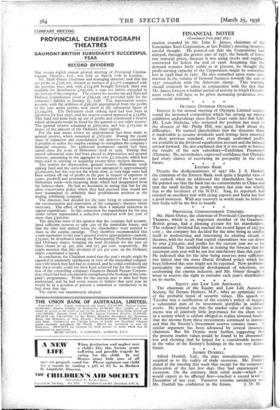COMPANY MEETING
PROVINCIAL CINEMATOGRAPH THEATRES
GAU MONT-BRITISH SUBSIDIARY'S SUCCESSFUL YEAR RECORD DIVIDEND
THE twenty-eighth annual general meeting of Provincial Cinema- tograph Theatres, Ltd., was held on March 17th in London.
Mr. Mark Ostrer (chairman and managing director) said that the net profit, at £506,702, showed an increase of £2,777 compared with the previous year, and, with- £124,366 brought forward, there was available for distribution £631,068, a sum not before exceeded in the history of the company. The reserve for income tax and National Defence Contribution stood at £89,246, and provided fully for the company's liability to January 31, 1938. The depreciation reserve account, with the addition of £98,500 appropriated from the profits of the year under review, now stood at the substantial figure of £1,094,085. The Debenture stock sinking fund had now been in operation for four years, and the reserve created appeared at £53,685. This fund had been built up out of profits and constituted a reserve which ultimately would be freed for the general or any other reserve. The general reserve remained at £675,000, and was £175,000 in excess of the amount of the Ordinary share capital.
For the year under review no appropriation had been made to general reserve, which remained at £675,000. During the recent years of expansion and consolidatian the directors had considered it prudent to utilise the surplus earnings to strengthen the company's financial structure. No additional permanent capital had been raised since the issue of Debenture stock in 1929. During that period substantial sums had been placed to depreciation and general reserves, amounting in the aggregate to over £1,200,000, which had been used in erecting or acquiring twenty-three modern theatres. The reserve for depreciation, general reserve, Debenture stock sinking fund and the carry-forward now amounted to approximately £2,00o,000, but this was not the whole story, as very large sums had been written off out of profits in the past in respect of expenses of issues, goodwill and premiums on the redemption of the 6 per cent. Debenture stock—non-recurring items which had disappeared from the balance-sheet. He had no hesitation in saying that but for the ultra conservative policy which they had pursued they would not have maintained so definitely their predominant position as the leading exhibiting company.
The directors had decided for the time being to concentrate on the reconstruction and renovation of the company's theatres where necessary. The effect of this would show a material reduction in capital expenditure. In this connection the expenditure for the year under review represented a reduction compared with last year of more than £300,000.
The directors were of the opinion that the company had accumu- lated sufficient reserves to take care of the immediate future, and that the time had arrived when the shareholders were entitled to share in the surplus earnings. They therefore recommended that a sum equivalent to last year's general reserve appropriation—namely, £75,000, be distributed among the Participating Preferred Ordinary and Ordinary shares, bringing the total dividends for the year on these shares to 91 per cent. and 221 per cent. respectively. He might mention that this dividend of 22i per cent. on the Ordinary shares constituted a record. In conclusion, the Chairman stated that the year's results might be regarded as eminently satisfactory in view of the intensified competi- tion with which they had had to contend, and he could confidently say thit these results could not have been achieved but for the co-opera- tion of the controlling company, Gaumont-British Picture Corpora- tion, which had had considerably strengthened the booking of the com- pany's programmes. Profits- for the current year to date had been maintained, and he had every reason to believe that next year he would be in a position to present a statement as satisfactory as he had done that day.
The report was unanimously adopted.










































































 Previous page
Previous page